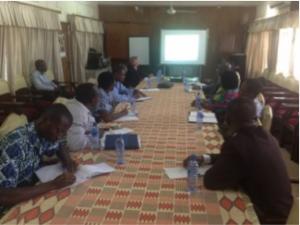WHO provides technical support to fight Cholera Outbreak in Ghana
September 17, 2014 - Two experts from WHO, Dr Dominique Legros (HQ Geneva) and Dr Mamoudou H. Djingarey (IST-Ouagadougou) were in Accra from 5th September to 10th September, 2014 to provide technical support to the Ministry of Health in its effort to control the outbreak of cholera in Ghana.
The two held a debriefing session on 10th September, 2014 with officials from the Ministry of Health, Ghana Health Service, Development Partners, relevant stakeholders from other Ministries, Departments and Agencies (MDAs) and UNICEF. The technical support was in the area of risk assessment, including further mandate to:
Evaluate relevance and coverage of containment measures and the effectiveness
Advise on possible usefulness of mass cholera vaccination to curb the epidemic
Assess logistics needed and strategy for carrying out a mass cholera vaccination should the conditions be met for carrying out such an exercise
Formulate recommendations for the way forward to contain the outbreak.
In their debriefing, the team made reference to their findings after visits to some key communities which have recorded high incidence of the cholera outbreak as well as health facilities including Achimota Hospital and the Korle-bu Teaching Hospital.
The team recommended that there was a need for a national response to address an issue that is beyond health sector. According to the team, cholera is beyond health sector alone and that hospital care, antibiotics, rehydration, vaccinations are just downstream measures from a developmental/urbanization problem.
There was the need for multi-sectoral approach involving the Ministry of Water Resources, Works and Housing, Department of environmental Health, Waste Management Services, Partners and NGOs in the response to the epidemic.
Furthermore the team recommended that there was also the need to strengthen social mobilization in peri-urban communities where cases are coming from.
With regards to the possible introduction of the cholera vaccine (OCV) in this current epidemic, the team recommended it would not be prudent to do so since the epidemic has already reached its peak. Rather improving access to potable water and adequate sanitation, which is the mainstay of controlling endemic and epidemic cholera (and any diseases spread by the fecal-oral route), early detection of cases and the timely and effective management of cholera cases and health education to promote good hygiene practices were the most efficient ways of preventing the spread and limiting mortality.
However, cholera vaccination can be considered as part of targeted multisectoral interventions (water and sanitation, food safety, patients care, vaccination, emergencies and outbreak response, social mobilization, etc.) to prevent the re-emergence of cholera in highly endemic settings (“hot spots”)
Ghana has recorded an outbreak of cholera since June this year. As of 10th September 2014, cumulatively, 14,411 cases including 127 deaths (Case fatality rate of 0.9%) have been reported from 74 districts in 8 out of the 10 regions in the country.
___________________________________________
For media inquiries you can contact:
WHO Country Office, Accra, Ghana
Dr Magda Robalo WHO Representative, Ghana
Email: robalom [at] who.int (robalom[at]who[dot]int)
Dr. Sally-Ann Ohene –NPO/DPC
Email: ohenes [at] who.int (ohenes[at]who[dot]int)
Ms Joana Ansong- NPO/HPR
Email: ansongj [at] who.int (ansongj[at]who[dot]int)



